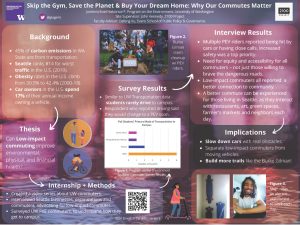Skip the Gym, Save the Planet & Buy Your Dream Home: Why Our Commutes Matter
The way we get from one destination to another is an important, often overlooked part of our daily lives. Most of us hop in our cars only to crawl through soul-crushing traffic, day after day. Car-commuting, while at times efficient, also has major disadvantages – time wasted sitting in traffic, air pollution and lack of physical activity resulting in health problems, climate change worsened by tailpipe emissions, and car ownership expenses along with costly road development and maintenance are just some of the issues car-use creates. So why not park our cars for a walk or bike ride? To understand the challenges low-impact Seattle commuters face, I partnered with 2100 Project, conducting interviews with businesses and organizations focused on low-impact commute options in Seattle, as well as Seattle commuters who had ditched their cars for low impact alternatives. Interviews centered on how the city of Seattle could improve alternative commute options for those desiring to commute without their car. Improved safety and increased accessibility were the two factors most interviewees agreed were essential in helping people ditch their cars for low-impact alternatives. Commuters who chose low-impact alternatives reported a better sense of community and connection with the city, suggesting that when we prioritize low-impact commuter safety and accessibility, we will create a deeper sense of community throughout Seattle.
